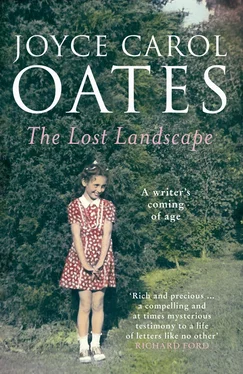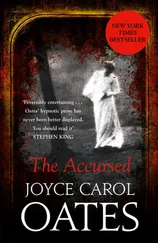There was something strange about the Grandfather and the Grandmother but the little girl could not guess what it was. Later she would learn that the Grandfather and the Grandmother were not the Mother’s actual parents but her stepparents and it was worrisome to the little girl, that in some way steps were involved. Like the long frightening stepladder that only Daddy could climb to pick pears, apples, and cherries from the highest limbs of the trees.
The little girl noticed that, when her parents were speaking together, or any adults were speaking together, if she came near they might cease speaking suddenly. They would smile at her, they would say her name, but they would not reveal what they had been saying.
The little girl ran away to hide, sometimes. When the adults were speaking sharply to one another. When the Grandfather cursed at the Grandmother in Hungarian, and the Grandmother wept angrily and hid her flushed face in her hands.
The little girl had several times seen the Grandmother’s long coarse gray-black hair straggling down her back like something alive and livid. The little girl shut her eyes not wanting to see as she shrank from seeing the Grandmother’s large soft melon-breasts loose inside a camisole, that was wrong to see for there were things, the little girl realized, that it was wrong to see and you would be sorry if you saw.
On a farm, there are many such things. Wild creatures that have crawled beneath a storage shed to die, or the bones of a chicken or a rabbit all but plucked clean by a rampaging owl in the night.
“Joyce Carol! Come here .”
With a nervous little laugh like a cough the Mother would shield the little girl’s eyes from something she should not see. Between the Mother’s eyebrows, faint lines of vexation and alarm.
“Sweetie, I said come here . We’re going inside now.”
SOMETIMES THE LITTLE GIRLwas breathless and frightened but why, the little girl would not afterward recall.
The little girl often took me with her to a special hiding place. Happy Chicken in the little girl’s arms, held tight.
My quivering body. My quick-beating heart. Smooth warm beautiful chicken-feathers! The little girl held me and whispered to me where we were hiding in the old silo beside the barn, that wasn’t used so much any longer now that the farm didn’t have cows or pigs or horses. Smells were strong inside the silo, like something that has fermented, or rotted. The little girl’s mother warned her never to play in the silo, it was dangerous inside the silo. The smells can choke you. If corncobs fall onto you, you might suffocate. But the little girl brought me with her to hide in the silo for the little girl did not believe that anything bad could happen to her.
Except the little girl began more frequently to observe that if a chicken weakened, or fell sick, or had lost feathers, other chickens turned on her. So quickly—who could understand why? Even Happy Chicken sometimes pecked at another, weaker chicken—the little girl scolded, and carried me away.
No no Happy Chicken—that is bad.
We did not know why we did this. Happy Chicken did not know.
It was like laying eggs . Like releasing a hot little dollop of excrement from the anus, something that happened.
Hearing a commotion in the barnyard, the little girl ran to see what was happening always anxious that the wounded hen might be me —but this did not happen.
Though sometimes my beak was glistening with blood, and when the little girl called me, I did not seem to hear. Peck peck peck is the action of the beak, like a great wave that sweeps over you, and cannot be resisted.
THE LITTLE GIRL GREWup, and grew away, but never forgot her Happy Chicken.
The little girl forgot much else, but not Happy Chicken.
The little girl became an adult woman, and at the sight of even just pictures of chickens she felt an overwhelming sense of nostalgia, sharp as pain. Especially red-feathered hens. And roosters! Her eyes mist over, her heart beats quick enough to hurt. So happy then. So long ago . . .
Still, she would claim she’d never seen a chicken slaughtered. Never seen a single one of the Rhode Island Reds seized by the legs, struggling fiercely, more fiercely than any human being might struggle, thrown down onto the chopping block to be decapitated with a single swift blow of the bloodstained ax, wielded by a muscled arm.
It was the Grandmother’s arm, usually. For the Grandmother was the chicken-slaughterer.
Which the girl had not seen. The girl had not seen.
The girl did recall a time when Grandfather was not so big-bellied and confident as he’d been. When the Grandfather began to cough frequently. And to cough up blood. The Grandfather no longer teased the little girl, or caused her to run from him crying as she’d run from Mr. Rooster. The little girl stared in horror as the Grandfather coughed, coughed, coughed doubled over in pain, scarcely able to breathe. The Grandfather would scrape phlegm up from his throat, with great effort, and spit the quivering greenish liquid into a rag. And the little girl would want to hide her face, this was so terrible to see.
It was explained that the Grandfather was sick with something in his lungs. Steel-filings it was said, from the foundry in Tonawanda. The Grandfather had hated his factory-job in Tonawanda but the Grandfather had had to work there, to support the farm. For the farm would not support itself, and the people who lived on it.
The Grandfather had liked to say in his laughing-bitter way that he and the other workers should be running the foundry and not the goddamn owners. Until the terrible coughing spells overcame him the Grandfather would say how the workers of the world would one day rise against the goddamn owners but that was not to happen, it would be revealed, in the Grandfather’s lifetime.
SELLING EGGS, SITTING OUTby the roadside. Sitting, dreaming, waiting for a vehicle to slow to a stop. Customers.
How much? One dozen?
Oh that’s too much. I can get them cheaper just up the road.
Always there were eggs for sale. And, at the end of the summer pears in bushel baskets. Sweet corn, tomatoes, cucumbers, potatoes. Apples, cherries. Pumpkins.
With a faint sensation of anxiety the little girl would recall sitting at the roadside at the front of the house behind a narrow bench. When sometimes the Mother had to go inside for a short while and the little girl was left alone at the roadside.
Hoping that no one would stop. Hoping not to see a vehicle slow down and park on the shoulder of the highway.
Some of the anxiety was over chickens, that made their blind-seeming way down the driveway, to the highway. Chickens oblivious of vehicles speeding by on the road, only a few yards from where they scratched and pecked in the dirt.
Anxiously the little girl watched to see that no chickens drifted out onto the road. The little girl knew, though she wasn’t altogether certain how she knew, for she’d never seen , that from time to time chickens had been killed on the road.
Sudden squawking and shrieking, and a flapping of wings. At first you rush to see what it is, and then you do not want to see what it is.
One of the constant fears of the little girl’s life was that Happy Chicken might be hit on the highway for the little girl could not watch me all of the time.
Each morning running outside breathless and eager to call to me—Happy! Happy Chicken!
And I came running, out of the coop, or out of the barn, or out of a patch of grass beside the back door, hurrying on my scrawny chicken-legs to be stroked and petted.
Читать дальше












